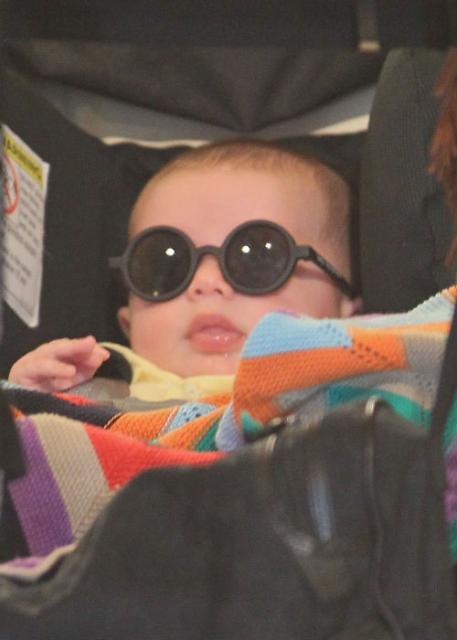Search
Democracy Links
Member's Off-site Blogs
helicopter parenting .....

The soft-roader in front sports one of those ridiculous ''baby on board'' signs that makes you want to shove its exhaust pipe up its rear-vision mirror. (Like, sure, I was going to rear-end you, but since you have a BABY on board I'll save my murderous impulses for the next person.)
The young mother - a blonde, but I'm saying nothing - hops out and barks that I'll need to park elsewhere: she has a baby on board and a stroller to extract. Together, it seems, these ordinary little facts constitute an inalienable right to two full inner-city parking spaces.
You've heard of eating for two; this is parking - living, breathing, scheming - for two.
I should have stood firm, explained something about the Christmas spirit, about donkeys and mangers, and the dignity of humility; about how graspingness on your infant's behalf is no less ugly - and perhaps even uglier - than the standard sort.
Were I Moir, I'd likely have whisked up a rear-view cartoon showing Mary on a donkey, blue-clad and star-watched, with a big yellow diamond on her back. Baby on board. But motherhood is so, well, beyond criticism.
In Mary's time, motherhood no doubt needed a leg up. (Mothering God, especially, would be no small ask; the blogosphere resounds with debate about whether she smacked.)
Even when I first did it, motherhood meant moving to second class. I recall thinking the phrase "falling pregnant" must have had literal roots. But now, with pregnancy so fashionable even men brag about it, and with young women replete with entitlement as well as offspring, does motherhood really need more privilege?
Are children really the most valuable humans? Does their newness entitle their maternal courtiers to sweep us aside like peasants? Or is propagation already special enough? It's not like humans are endangered.
Joseph Epstein famously coined the term kindergarchy - rule by children. Kindergarchy doesn't just foreground the formerly seen-and-not-heard, but lavishes upon them adult expense, anxiety and attention in ways and quantities unprecedented.
I chanced upon a young woman in the park, standing hands to ears while her toddler screamed relentlessly from the bushes. "She wants me to carry her," the woman apologised. "I know it seems mean," she added, "but my physiotherapist told me not to."
"Good for you," I said, but as I strolled off she was offering the bush-beastie treats if it would only walk.
In what world is it ''mean'' not to wreck your back by carrying a child the size of a small mastiff?
Answer: in a kindergarchy. A world devoted to sustaining childhood as a perfect bubble, without negative emotion. A world where all decisions - where to holiday, what to watch, who to befriend, how to live - are taken for and often by the kids. Where adults avoid doing bad things such as divorce, booze, adventure or (God forbid) swearing - not because they're necessarily wrong in themselves, but because nothing must threaten the kiddies' bubble.
Many parents devote their entire lives to this saccharine pretence. Why? Because they're terrified that if they do not - if for one minute they allow the realities of pain or mess or despair to impinge on their children's delicate consciousness - said kids will be terribly and irrevocably damaged; they'll start throwing up, shooting up or sticking up.
In the London riots, as hordes of kids in need of a good bottom-smacking were joyously filching stuff from shops just because they could, people blamed disadvantage.
Penny Red blogged: "People to whom respect has never been shown riot because they feel they have little reason to show respect themselves, and it spreads like fire on a warm summer night."
But now it seems the opposite is true. Many of the rioters, like football hooligans a generation earlier, were educated, middle-class and loved. They took plasma tellies because they wanted them, they felt entitled, they were there. Far from rioting from too little self-esteem, they were rioting from too much.
Parents overstuff their children's self-esteem along with their Christmas stockings. But unearned self-esteem is every bit as dangerous as excess calories. Kids of the self-esteem generation, now adult, are so fragile they're known by US college deans as "teacups". Feeling every sadness as insanity, they fill psychiatrists' waiting rooms.
The psychologist Wendy Mogel says "well-intentioned parents have been metabolising their anxiety for them their entire childhoods, so they [cannot] deal with it when they grow up". The irony is that the caring, open-ended parenting designed to help them avoid the shrink, takes your kids there.
But just how kind is it to rear your child as a dauphin?
Certainly, there's an element of selflessness, driven partly by behaviourist terror. To believe that you shape your child entirely makes you entirely - ludicrously - responsible. The schizophrenogenic, criminogenic, general-screw-up-ogenic mothers are contemporary versions of the old witch-hunt, whereby women bear the world's guilt.
It's Philip Larkin's rule: "They f--k you up, your mum and dad, they may not mean to but they do."
But there's also the fact that most helicopter parenting is about the parent, not the child. It's the parent's decision to over-service. The parent's need for perfection. The parent's view of child as masterpiece. Perhaps we need to accept Larkin's rule - or Voltaire's: ''The perfect is the enemy of the good.''
I don't know whether Mary ever smacked God's bottom, but I bet she didn't self-flagellate over how he turned out.
- By John Richardson at 22 Dec 2011 - 2:04pm
- John Richardson's blog
- Login or register to post comments
Recent comments
7 hours 49 min ago
9 hours 42 min ago
10 hours 46 min ago
11 hours 18 min ago
11 hours 55 min ago
12 hours 20 min ago
12 hours 30 min ago
13 hours 42 min ago
16 hours 4 min ago
1 day 1 hour ago